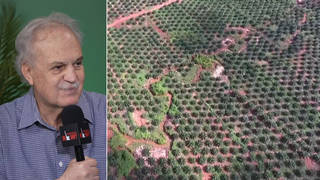
Hundreds gathered yesterday in New York to honor an exhibit at the Museum of the City of New York called “Facing Fascism: New York and the Spanish Civil War.” Across the street at the Museo Del Barrio, one of the speakers at the event was the musician, actor and activist, Harry Belafonte. We play an excerpt of his address. [includes rush transcript]
Transcript
AMY GOODMAN: We turn now to the event yesterday honoring Veterans of the Abraham Lincoln Brigade. As hundreds gathered to honor the exhibit at the Museum of the City of New York called “Facing Fascism,” across the street at the Museo del Barrio, one of the speakers was the actor, humanitarian, singer Harry Belafonte.
HARRY BELAFONTE: One of the great rewards in being a part of the today’s ceremony was the knowledge that, having just turned 80, that I would be sharing this platform mostly with people who are much older than I am. But even in that delight, one cannot overlook the fact that all who are gathered here represent an important part of the American soul, an important part of what this nation is really about.
When I entered into the building just a few moments ago, a lady thrust in my hand a button that I thought would be far more fitting than a carnation. And it just simply says, “It’s a man’s world, until women vote.” It’s about today. It’s about the climate of our times. It’s about where we stand as a result of the remarkable sacrifices made by valiant men and women, who in the dawning of the 20th century did much to shape the idea of an America that we’ve all aspired to since their time. The workers of America did much in coming together to try to shape a society that would be forever devoted to the dignity of the working class and would never — and would try to make a nation that would be forever conscious about its diversity, about its opportunity, and would forever be committed to the idea that we lived in a world where our humanity should be the first item of our consideration, and all else after.
When I was a youth, much was said about what went on in Spain in the war in 1936, when it started, and in 1937, when the Lincoln Brigade and the international forces from around the world came together to fight against fascism in Spain, and the great price and the great heroism that was displayed during that struggle by the men and women of the world who tried to greet the dawning of fascism in all of its vicious aspects. It was they who clearly alerted the world to the fact that the 20th century would not be a century of calm, that unfortunately it would not be a century of peace, that the military-industrial complex was very much on the rise, and that all people, all decent people in the world, would have to be vigilant about what this union of tyranny would visit upon the nations of the world.
It is almost ironic, but cannot be viewed without note. The last thing that Dwight D. Eisenhower said, or one of the last things in his presidency, at the end of his presidency, was, he warned that the American citizens, of all the things they must be mindful of was that they should be vigilant and mindful of what was going on with the military-industrial complex in this nation, that it is an entity that we should be most cautious of. And no words could have been more prophetic.
It was not the first time such utterances were made. They were made constantly by all the great union leaders and all the great forces of the early part of that century that did much to try to shape the unification of a world that was emerging to find a place of dignity and a place of commonality. It was in place where colonialism for so long had dominated the affairs of the nations of the world — Africans, Asians, people in Latin America and the indigenous. It was a place here in America where workers were constantly battling for a decent wage and a decent way of life in the midst of those who are stimulated by greed and avarice, would further try to diminish the dignities of workers and would try to do what they have done so consistently.
That force is still in our midst and has been very glaringly demonstrated by what has happened with the Bush administration and what they have done to this nation over the last few years. I made an utterance not too long ago describing Bush as the greatest tyrant in the world. I was somewhat hasty. I was somewhat hasty in making that remark, because the truth of the matter is is that since I had not met all the great tyrants in the world, I’m not sure that he could be number one. But he’s a damn good candidate.
And as the people in the world struggle to lift the weight of oppression off of their shoulders and their backs, it is indeed a time for all of us to be of heart, for all of us to feel stimulated by what the future promises. As the left struggles to find its course for the 21st century, as it struggles to come together to find a purpose and to find goals that can tie us together in a much more compelling way than we’ve been able to do up to now, we have promise in our midst when you look at the kinds of gains that are being made by the workers and the people in Latin America, throughout Bolivia and throughout Venezuela, that the revolution in Cuba, as it continues to try to build and find its way into a greater society, still sustains and still gives hope to people all over the world.
And as I move across the length and breadth of this country, much of my time is spent with what Frantz Fanon would call “the wretched of the Earth.” I spend a great deal of time among men and women who serve in the prisons of America. I’m awakened to their plight, because Paul Robeson and Dr. Du Bois and others warned of this moment and told us to be vigilant and to be aware of all that would take place as we continue to struggle against the forces of fascism and against the compelling agenda of the right.
Dr. Martin Luther King once said to me, when coming from an encounter with gangs in the ghettos of America, he said, “You know, I share more with the young men and women in struggle in the ghettos of our nation than I do with those who have attained lofty heights and who delight in their middle-class pleasures. I would gladly trade 500 prisoners in the ranks of our struggle, and I would in exchange give you 15,000 Baptist ministers.”
And so, with that rather curious and interesting remark, there came a time when I thought that the best work that I could possibly engage myself in would be to go into the darkest places of American society, to go into the heart of the Latino community, of the Native American community, where the greatest suffering can be revealed, and to go into the heart of the black community across the length and breadth of this nation and speak to the young. And although for a long time, in the last 25-odd years, one could have said how youth seemed to have lost its way, somehow retreated as if the choice was exclusively theirs, but those who preceded the young of this generation did much in blundering in the way in which we passed the baton. So busy were we moving into the new successes that the civil rights movement had unfolded for us that we abandoned the revolution. And while we filled seats in the legislative halls of America, while we filled new places in the economic affairs of America, we left our communities. And our young people for a long time did not know quite where to go and in the midst of their own pain and degradation did what we had to do back in the 1930s. They had to turn to themselves and look to themselves for solutions to the needs of the day. And it is in their midst that so many young leaders sit and are studying and are emerging, that I think will be very encouraging for what the future of America will look like.
When I go across America, on the reservations of this country among Native Americans, and listen to what young Indian men and women are saying, when I move across the length and breadth of this country into California among workers, the Latino youth and newly arriving immigrants, what they have to say, when I move among the communities of the black underclass and I listen to what the young people there have to say, I am heartened and I’m encouraged that the legacy that has been left to us by the men and women who so valiantly struggled in the early parts of the 20th century, the examples set by the Abraham Lincoln Brigade and all anti-fascist forces, has indeed not died. Those flames of hope have been reawakened in the hearts and the minds of our young people, and they’re coming together, they’re speaking, they’re seeking, they’re looking for leadership, they’re looking for answers. And each time I go among them and speak about the great noble things of our past, they take heart, their eyes flash brightness, their minds become awake, and they begin to dig into the blueprints of their history, and they find courage and they find purpose.
I stand and I speak in their name, when I say to the Lincoln Brigade, thank you so much for what you have given all of us, me in my youth and the youth of today. Without your courage, without your vigilance, without your insight, America could never have hung on as tenaciously as we have done to the things that are decent about this country. It is your example, it is that what you have given us, that has helped guide us through some of the darkest times in the history of this nation.
We defeated Hitler, but we did not defeat fascism. We defeated McCarthy, but we did not defeat fascism. And now, as George W. Bush sits in the wake of his own destruction, we are still going to have to deal with fascism, because it is not easily killed, it is not easily crushed. We still have work to do. We must still be vigilant. And all we need to do when we have moments of doubt is to look back at what was given us by the Abraham Lincoln Brigade and the valiant sacrifices that were made by them to know what we have to do in our time.
Robeson, when I visited him in his last days in Philadelphia, when I asked him about the journey that he had been on, I asked him whether with all that he had achieved and the sacrifices that he had made, did he in the final analysis feel that it was all worth the pain and the anguish. And he said in a halting voice, “Never doubt the fact that the path that I have taken has served me well. It was an honorable one and one that if I had to do again, I would do it all over again.” He said, “It is not the victories that we may have gained or the losses we may have experienced, but it is in fact the journey itself that makes the difference. It is the men and the women and the courageous moments that are revealed to us that makes the journey towards freedom, towards human dignity, a battle and a journey worth taking, and I’m glad I was on it.”
He said, “But I must tell you something. No matter what we may have achieved in our lifetime, the generations who come after us will always feel that we never did enough.” Well, as true as that may be, he also added this. He said, “But in the final analysis, no matter what is said, each generation must be responsible for itself. And in the midst of my time and my youth, when I volunteered to serve in the United States armed forces during the Second World War as a munitions loader in the United States Navy, and then subsequently coming from that service into an America that instead of giving the veterans of our time the rewards that we deserved, having been victorious against the armies of fascism, we came back to an America that was more cruel than ever. Segregation was fanned as a new flame. The tyrants of our time came to the fore to try to maintain business as usual. And we said there will be no such — we cannot accept such an agenda. And as we looked around the world, we found others in Asia and Africa, who also thought they would be rewarded by the success that had been achieved in the battlefields of the world against fascism, but all those nations” —
AMY GOODMAN: Harry Belafonte speaking this weekend, honoring the new exhibit at the City of New York called “Facing Fascism: New York and the Spanish Civil War.”












Media Options